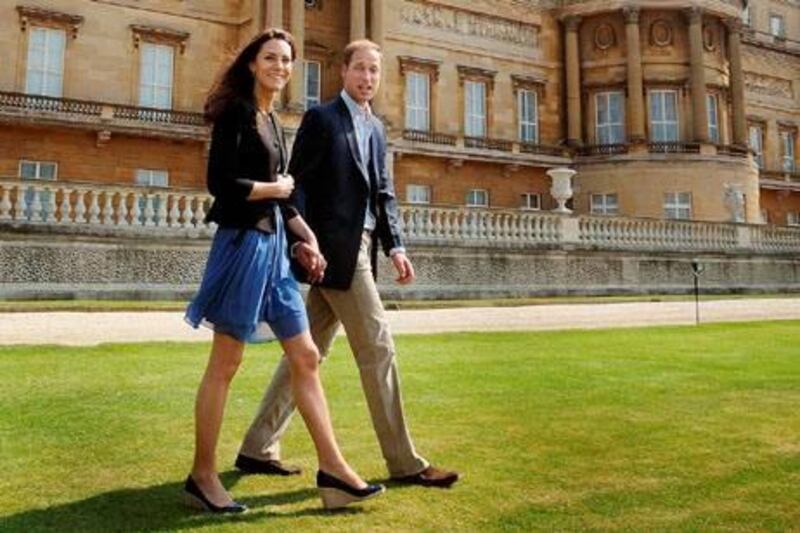LONDON // After weeks of intense, if wholly ill-informed media speculation, the honeymoon destination of Britain's most famous newlyweds was finally revealed yesterday - absolutely nowhere.
The new Duke and Duchess of Cambridge, whose wedding on Friday was watched by a television audience worldwide of two billion, have decided to delay their honeymoon until a later date, a spokesman for the couple said yesterday afternoon.
Instead, Prince William and his wife, Kate, who were up until the wee small hours of yesterday partying with family and friends at Buckingham Palace, will spend the next two days at an undisclosed location in the UK before the prince returns to work as an RAF search and rescue helicopter pilot next week.
Originally, Prince William was understood to have taken two weeks' leave following the Westminster Abbey marriage.
It led the world's press to indulge in an orgy of supposedly informed speculation about the honeymoon, although the guesses turned out to be as far from the truth as the destinations were as far apart geographically.
The Red Sea resort of Aqaba in Jordan emerged as the favourite, closely followed by an island on Australia's Great Barrier Reef. Then there was Kenya, Chile, any number of Caribbean islands, Scotland, the Scilly Isles off south-west England, Ireland, South Africa, New Zealand and, most bizarrely perhaps, Transylvania in Romania.
But, to the disappointment of the ranks of paparazzi who, yesterday morning, were ready to fly anywhere in the world for that million-dollar photograph of the couple, a royal family spokesman broke the no-honeymoon news yesterday afternoon.
"The Duke and Duchess of Cambridge have chosen not to depart for a honeymoon immediately," he said.
"Instead, after spending the weekend privately in the United Kingdom, the duke will return to work as a search and rescue pilot next week.
"The locations of both their private weekend before the duke returns to work and their future honeymoon, which will be overseas, will not be disclosed in advance."
He stressed the oft-repeated position of the royal family that the couple wanted the media to respect their privacy over both the weekend and during their belated honeymoon, whenever that might be.
The best bet among royal watchers later was that the newlyweds, who left Buckingham Palace yesterday morning, walking hand-in-hand to a waiting helicopter, had headed to the Queen's Balmoral Estate in Scotland.
Apart from being set in stunning scenery in the Scottish Highlands, the venue is thought to offer the couple some much-needed tranquility after being in the glare of the public spotlight since announcing their engagement last November.
Following the break, the couple hope to be able to live a fairly normal life - barring public engagements - in Anglesey, an island off north Wales, where the prince is based.
Paddy Harverson, a spokesman for the prince, told the BBC: "I think it'll be about striking the balance between their public and private lives.
"The most important thing to remember is that he's not heir to the throne, he's second in line, and he's not a full-time royal - he's a full-time pilot working a normal job for the RAF search and rescue. And so he will be doing that most of the time and she, as his wife, will be with him. So in that sense their natural home, their natural place will be up in Wales. And I think people will understand that."
Television viewing figures released yesterday showed that more than 24 million of Britain's 60 million population watched the marriage live, the majority of them opting for the BBC's coverage.
More than nine million people also used the BBC news website featuring live coverage of the wedding.
Peter Hunt, the BBC's diplomatic and royal correspondent, suggested yesterday that the wedding and the favourable publicity it had generated, had reinvigorated the British monarchy. "This moment is much more than just the personal celebration of a commitment of a duke to his duchess - important as that is, given the recent, painful history of royal marriages," he said. "These occasions also help to reinvigorate the monarchy. They generate fresh interest in its activities; and they offer the promise of another generation to come to sustain it.
"Despite remarkable changes in attitudes since the Queen was crowned, opinion polls show a majority of the population still favour keeping things the way they are."






